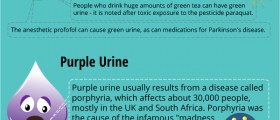What Is a Prostate Infection?
A prostate infection — medically called prostatitis — is characterized by the inflammation of the prostate gland. The gland itself is located below the bladder and its functions are to secrete prostatic fluid and aid ejaculation. This fluid protects the sperm cells and prolongs their lifespan.
Patients suffering from a prostate infection are mostly men between 30 and 50 years of age. Inflammation of the prostate gland causes intense pain during urination and ejaculation and doctors recommend antibiotics to relieve the symptoms and cure the infection once it has been diagnosed correctly. The treatment usually lasts for several weeks, up to a month, and the medications should be taken once or twice a day, exactly according to the doctor’s prescription.

Patients might feel better after some time, and even within a few days, but it is extremely important not to stop taking antibiotic medication simply because you are now feeling good, but to continue with the treatment for the whole course. If you stop with the antibiotics, your prostatitis can recur in a worse form. In certain cases, patients may not see an improvement of their condition. If that happens, your doctor may prolong the duration of the treatment or prescribe stronger medications.
Antibiotics for Prostatitis
When you visit your doctor complaining about having pain during urination and ejaculation, the doctor will usually diagnose a prostate infection after running some tests, and then prescribe medications to treat the problem. Diagnostic tests you can expect include a rectal exam and urine tests. In some cases, you will be offered an MRI scan. A prostate infection requires treatment with antibiotics and doctors usually prescribe: ampicillin, Bactrim Septra, cephalexin or Ciprofloxacin for this problem.
Ampicillin belongs to the group of penicillin antibiotics. Although it has been used for decades, ampicillin is still very helpful with many bacterial infections. Prostate infections caused by bacteria respond well to the treatment with ampicillin and bacteria haven’t been found to be resistant to this drug so far. Prescribed and taken in recommended dose, ampicillin can cure bacterial prostatitis.
Bactrimseptra contains two antibiotic drugs: trimethoprim and sulfametoxazole. The combination of these drugs has been shown to successfully treat various infections, including prostate infections, but it is not recommended for people allergic to sulfadrugs.
Cephalexin is another good option for prostate infections, especially for prostate infections caused by the bacteria known as Escherichia coli (or E.coli).
Ciprofloxacin or Cipro is also very useful for prostate infection. This is a fluoroquinolone drug and it can prevent worsening of the symptoms.
- Fluoroquinolones penetrate relatively well into the prostate and are therefore the therapy of choice for chronic bacterial prostatitis with a typical administration duration of 4 weeks.
- If the pathogen is resistant to fluoroquinolones, therapy with cotrimoxazole for 3 months is recommended.
- For recurrent chronic bacterial prostatitis, each episode can either be treated with antibiotics or long-term antibiotic prophylaxis can be administrated for a duration of at least 6 months.
- Surgical procedures such as transurethral resection of the prostate and radical prostatectomy are regarded as therapies of last resort or as therapies for concomitant obstruction.
These antibiotic drugs are very efficient as a treatment for prostatitis, but patients should be warned that these drugs come with certain side effects in some cases. The most common adverse effects people notice are nausea, headaches, a skin rash and diarrhea and these effects should be reported to your doctor.
What you should know is that antibiotics don’t work against chronic infection of the prostate gland and if you are suffering from this condition, your doctor will probably prescribe some other medications. Also make sure to report the first signs of prostate problems to your doctor right away, as timely diagnosis will give you access to the best possible treatment options, regardless of the cause.

















Your thoughts on this
Loading...